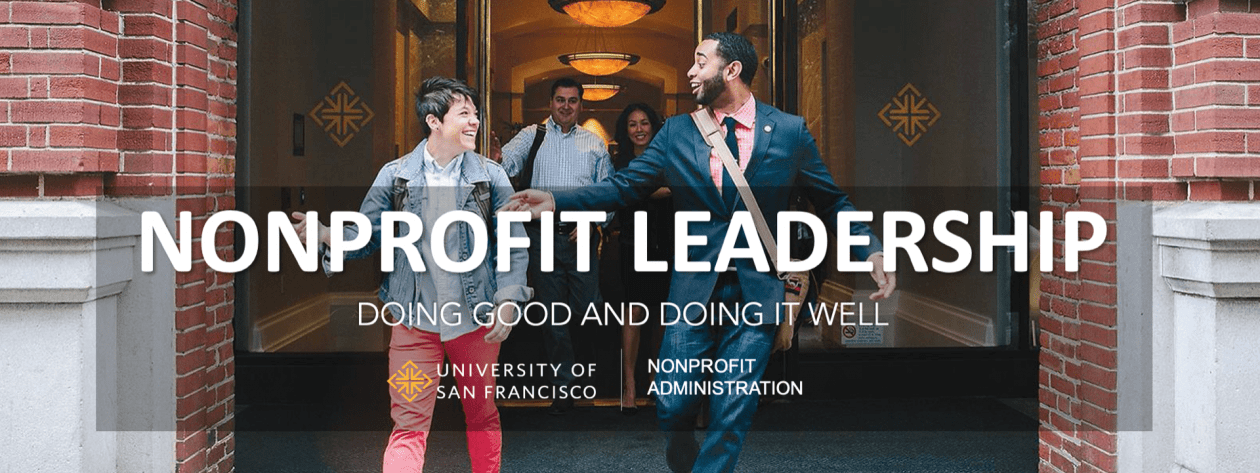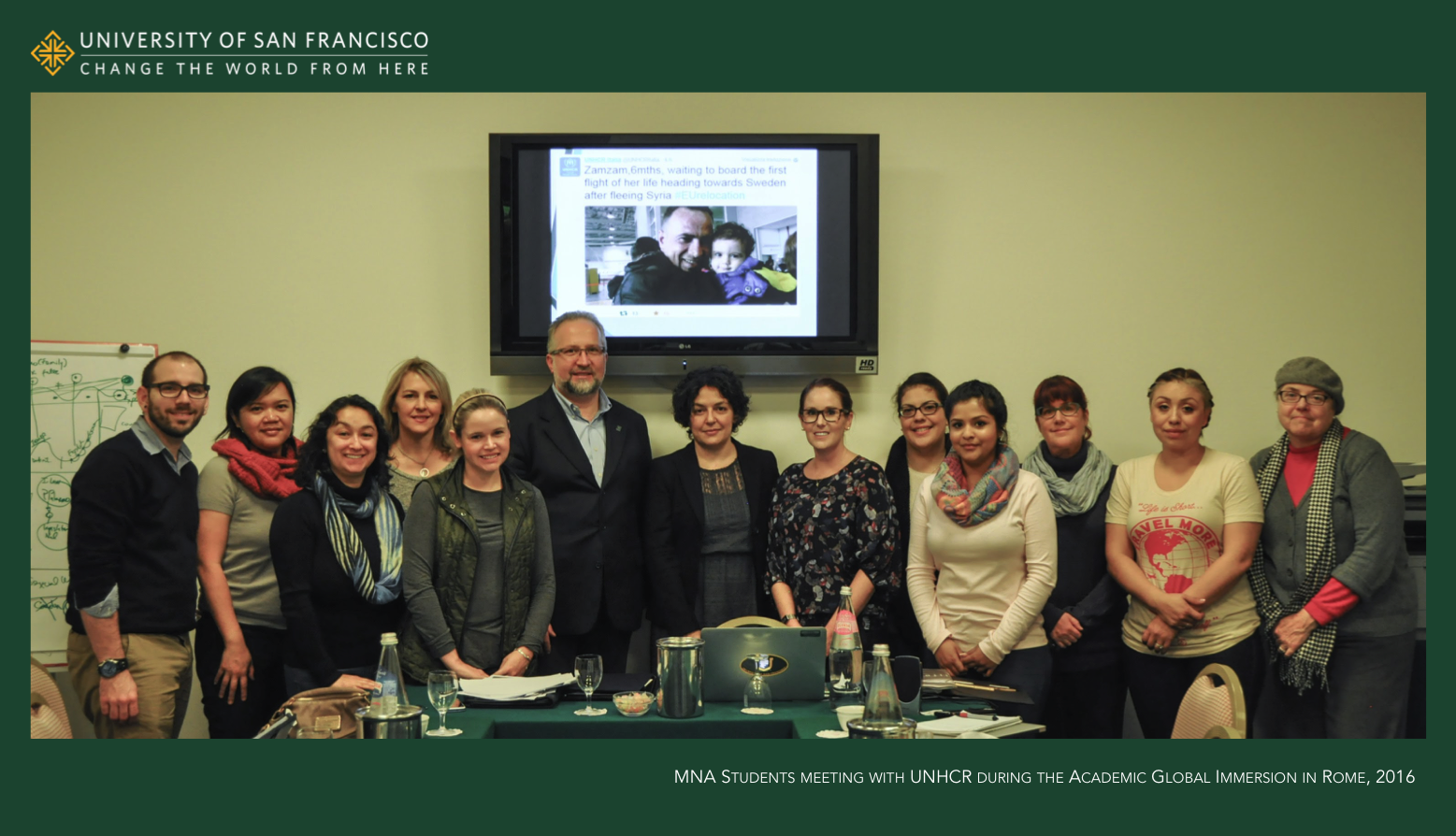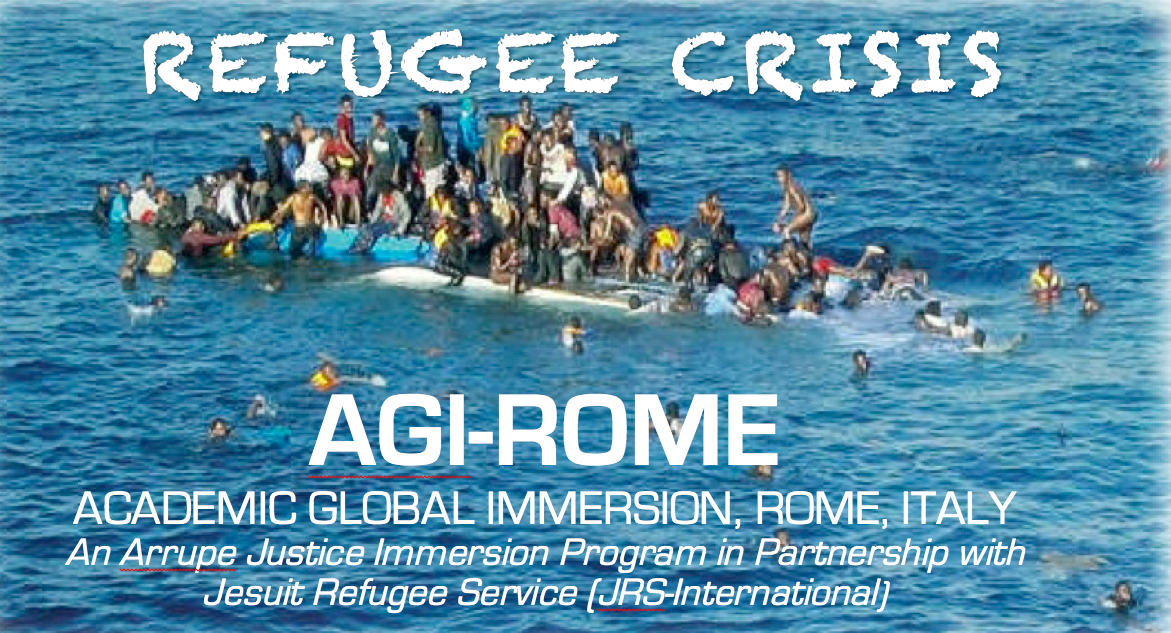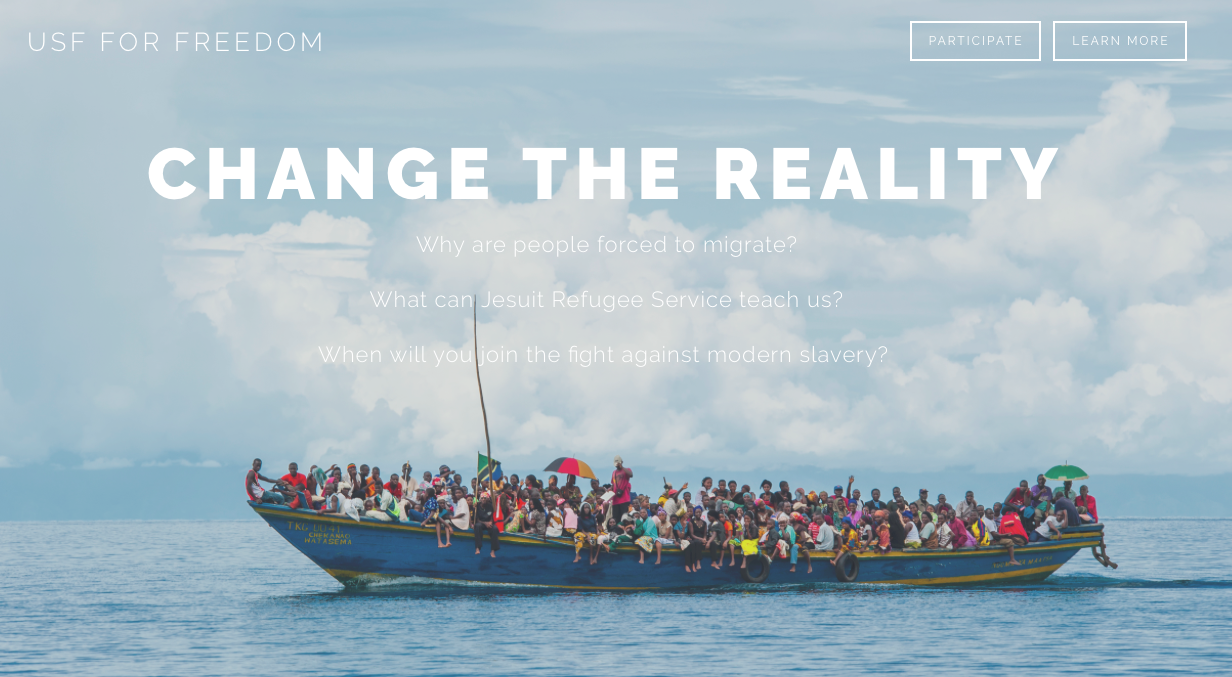Academic Global Immersions and Beyond
The MNA is global in nature. We assess nonprofit organizational capacity and nonprofit leadership effectiveness with a global and local (glocal) perspective. To do so we also encourage short term Academic Global Immersion (AGI) Programs for understanding the socio-cultural and politico-economic context of nonprofits and NGOs in other countries. In 2015, Dr. Marco Tavanti launched an AGI in Rome, Italy studying the refugee crisis and the role of NGOs and IGOs to adequately respond to the crisis. USF partners with Jesuit Refugee Service (JRS) an NGOs dedicated to the accompaniment, service and advocacy of refugee work. In 2016, Prof. Kevin Hickey lead a delegation of MNA and other SOM students to a program immersion in Washington DC where they met with several nonprofit and government agencies to understand best practices in advocacy and policy making. The AGI students were also instrument for the preparation and coordination of academic symposia back home where they connected with local nonprofits dedicated to human services, advocacy, refugee resettlement, and anti-human trafficking.
- AGI-MNA Programs Orientation Slides: AGI-MNA Program Orientation
The AGI-Rome Program


Program overview: The field of refugee service management involves many nonprofit and civil society organizations worldwide. Rome and the rest of Europe face an ongoing forced migration crisis illustrated by many displaced people, refugees, asylum seekers, and victims of human trafficking. International nongovernmental organizations (NGOs) and national nonprofits (ONLUS) struggle to provide adequate services while seeking just policies, solidarity, and innovative approaches. The Jesuit Refugee Service (JRS) international office is headquartered in Rome, Italy. Students learn about JRS’s programs, methods, and approaches in addition to other organizational leaders and experts in the field. Students will work on collaborative projects and experiential learning activities. They learn about international organizations and their works for effective humanitarian emergencies, cross-sector partnerships, and global policy advocacy. The mission of USF is central to this program as it shares the Jesuit values of JRS and it is connected to several nonprofits in the Bay Area engaged in refugee services and the fight against modern slavery.
Program Outcomes: The experiential, intellectual, and professional learning outcomes of this course/program include. (1) Recognizing the managerial, organizational and international factors behind the refugee and modern slavery emergencies of our time. (2) Comparing and contrast national policies and practices regarding forced migration affecting NGO and NPO programming. (3) Analyzing the cross-sector, cross-cultural and multidisciplinary elements of NGO management. (4) Recognizing the needs and develop solutions to increase the capacity of organizations and the effectiveness of programs, and (5) Aligning personal values with international human rights and Jesuit values of justice and human dignity.
- Read more in the AGI-Rome Blog: http://agirome.blogspot.com
Students Evaluative Comments
- “If a picture says a thousand words, an experience reframes a narrative. AGI-Rome not only reframed my personal narrative through experiencing the shared suffering of others, it articulated my reason for having a story.”
- “College students often wonder if their scholastic experiences will make a difference, AGI-Rome students don’t have that problem.”
- “I came in with pre-judgements and wasn’t sure how as a group we would all vibe together – and it turns out that I now have 11 amazing new friends. You all have such a strong and passionate nature, and the compassion that I witnessed us all practicing with each other in conversation, work and over wine in the evenings makes me feel assured that the world (for all of its problems) has hope because there are so many in the world that want to see it change for the better, and will make it happen. From witnessing the ruins of the Roman Empire to the white washed walls of Centro Astalli, thank you for an incredible experience and for being you.”
- “I have been trying to settle into my life with these new experiences incorporated. Realizing that so much of what I have seen and heard around accompaniment, hospitality, and education is what I personally believe. The goal for me is to bring some of JRS, Caritas, Comunita, etc. to my job here at home. For now, my desire to serve those who are trafficked or disenfranchised will be a voluntary position. Given my past personal experiences, I feel that I am too emotionally sensitive at this time to really find a calling professionally.”
- “In one of our readings, regarding the similarities and differences of EU and US immigration policies, there was discussion around refugees with highly skilled professions in their home countries having to take up “lesser” skilled jobs because the experience they have in their own country does not transfer to their host country. I believe one of our speakers during the week also spoke to this idea of individuals coming to a country and after expressing all that they have accomplished at home to a social worker in their new host country, the social worker summarized by saying, “so you don’t have any applicable experience”
- “As Mohammed told his story with such composure and grace, I was reminded of how powerful personal stories can be by turning that shame into something redeemed and made new. He made me feel like I was a friend of many years. I was humbled by how graciously he saved us from the excruciating details and was able to laugh through some of it as well. I know that I will be unable to relay his story adequately to others when I return to the Bay Area. But what I gained from Mohammed’s story is that I can work on my own story and package it in such a way to make impact, if I have a chance to share my walk with others.”
The AGI-DC Program
 The course associated with this immersion program (Leading Social Change: Institutions and Policy) explores the role of nonprofit organizations in the formation and implementation of public policy in the United States, including the political functions of the nonprofit sector, the implementation of government programs by nonprofit organizations, and the roles of nonprofit advocacy and lobbying in government decision-making. The academic immersion course in Washington, D.C. provides students the opportunity to learn directly from nonprofit leaders and others working at the federal level on issues of concern to nonprofit organizations. The immersion activities, panels, and discussions serve as the basis for critical analyses of policy issues important to the nonprofit sector. The goal of the AGI-DC is to develop students’ understanding of policy work at the federal level, and also garner insight from professionals in the field about possible career opportunities in policy advocacy work.
The course associated with this immersion program (Leading Social Change: Institutions and Policy) explores the role of nonprofit organizations in the formation and implementation of public policy in the United States, including the political functions of the nonprofit sector, the implementation of government programs by nonprofit organizations, and the roles of nonprofit advocacy and lobbying in government decision-making. The academic immersion course in Washington, D.C. provides students the opportunity to learn directly from nonprofit leaders and others working at the federal level on issues of concern to nonprofit organizations. The immersion activities, panels, and discussions serve as the basis for critical analyses of policy issues important to the nonprofit sector. The goal of the AGI-DC is to develop students’ understanding of policy work at the federal level, and also garner insight from professionals in the field about possible career opportunities in policy advocacy work.
- Read more in this article: Intercession International
USF4Freedom Symposia
The USF for freedom symposia connect the global to the local. MNA students who participated in the AGI are active to organize an annual event that reflects on the same issues addressed in their programs and connect with local nonprofit organizations dedicated to these very same issues. The 2015 USF4Freedom symposium explored the connections between refugee service, jesuit accompaniment and anti-human trafficking. The 2016 USF4Freedom explored the connection of the refugee crisis with the academic responsibility and the notion of human security in relation to forced migrations.
- Learn more at http://www.usf4freedom.org
AGI Milan-Piacenza


Designed by Boeri Studio, the Vertical Forest in Milan, Italy is a model for a sustainable residential building, a project for metropolitan reforestation contributing to the regeneration of the environment and urban biodiversity without the implication of expanding the city upon the territory.
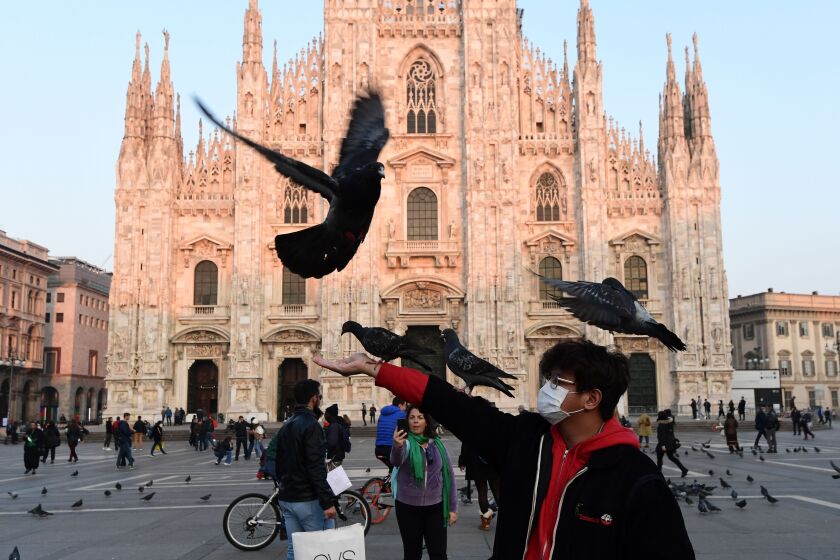
Italy is internationally recognized for its food quality and design in the fashion, transportation and luxury industries. How do these industries innovate for sustainability while maintaining traditional values? These subjects are the focus on this academic immersion program in Milan, Piacenza and other contexts in the north of Italy in partnership with the Università Cattolica Sacro Cuore (UCSC), the largest Catholic university in the world and the. University of San Francisco’s School of Management. We offer this opportunity to learn directly from industry experts and industry visits. Graduate students from different programs interested in sustainability, leadership, marketing, finance, and social economy are encouraged to apply.
The course associated with this program is NPA 699: Comparative Sustainability Innovation (2 credits) taught by Dr. Marco Tavanti, a USF Professor expert in sustainability reporting and Dr. Emanuele Vedramini, a UCSC professor an expert in international management. All AGI courses are applicable electives for any graduate program at USF. Selected students will visit industries and industry leaders from Barilla, Max Mara, Salvadore Ferragamo, Brunello Cucinelli, Mediobanca, Absolut Yacht, and Dallara car racing design and manufacturer. The selected industry visits have been carefully selected for their experiential learning value. Students arrange flight to Milan (MXP) and reach Grande Albergo Roma in Piacenza. Company visits and panels are coordinated and accompanied by UCSC professors who will help to critically reflect on the experiential learning. The program provides, double occupancy hotel accommodations, site visits transportation, breakfasts, lunches and some dinners. Student teams will work on comparative analyses during small group dinners. Students are required to attend two mandatory preparatory sessions and actively engage in the Canvas Course site for the required readings, discussions and assignments.
Read more about the AGI Milano-Piacenza at https://usfblogs.usfca.edu/4sustainability/
Read more about USF Global Immersions https://myusf.usfca.edu/immersions
Nonprofit Management Education – International Trends & Global Shifts
First Presented by Dr. Marco Tavanti to the Nonprofit Academic Centers Council (NACC) Professional Development Webinars on March 3, 2021. Read more at http://www.nonprofit-academic-centers-council.org/category/events/
